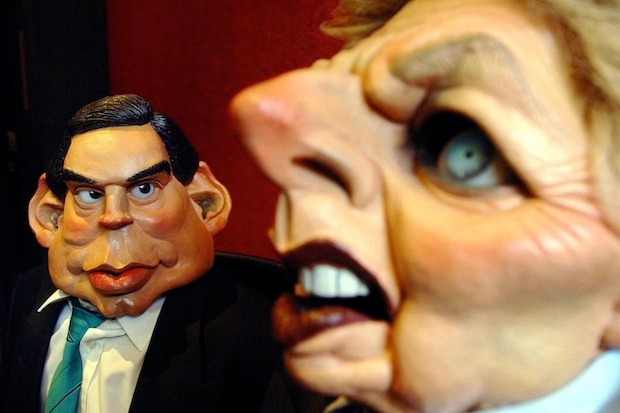When the cameras go live in the BBC studios tonight for their election coverage it will mark 65 years of televised analysis of the results. As the BBC’s own delightful paean to these programmes showed, it will also mark 65 years of an awful lot of hanging around. Election night coverage approaches what the film historian Charles Barr has called ‘pure television’: those occasions of live transmission with which cinema simply cannot compete.
It can be excruciating stuff. On election night in 1964 the evening’s host, Cliff Michalmore, filled time with a libidinous survey of the ‘lovely gals’ on show for the audience at home. Come 1979 we were treated to the sight of an increasingly anxious Michael Cockerell in Cardiff City Hall waiting for the Prime Minister, Jim Callaghan. Time passes, no Prime Minister appears and Cockerell fills time pondering this ‘city hall with many halls’ and whether Callaghan has ‘been taken up the back passage.’
For the broadcasters, there are two key questions: when to start broadcasting, and what to show before then. Going live to air on election night just as the polls close leaves you with a lot of time to fill. The earliest programmers of election night coverage in the 1950s had a very pragmatic response: don’t go live when the polls close. The polls then closed at 9pm but the first-ever election night results programme didn’t start until 10.45. This seems a sensible decision: in these early days producers were further stymied by not only the time to fill but with what they could or were willing to say. The BBC preciously guarded its reputation for impartiality (even after voting was over) whilst one of its first presenters, the academic and author of the 1945 General Election study R B McCallum, only agreed to do the job on the strict proviso that ‘he would be asked to give two or three considered comments during the course of the evening.’
By 1955 broadcasters seemed more certain of their ability to fill time until the results began to be announced and kicked off proceedings at 9.30pm, although their colleagues on radio continued their practice of providing: ‘Election Results broadcast as they come in, with light music in the intervals. Summaries of state of parties every quarter of an hour.’ Both the BBC and (from 1959) ITV soon settled into giving themselves a brief buffer of around 25 minutes before going to air after the polling had ended.
That changed in 1970 when voting for the first time carried on until 10pm. That year, as Big Ben struck ten, ITV went immediately over to its election programme hosted by David Frost and Alistair Burnett (the BBC held back until 10.25). Thereafter they chopped and changed until 1992, after which they consistently began at the times they will tonight.
When the BBC began to broadcast results, it was the country’s sole TV broadcaster. The first televised election night in 1950 was presaged by the corporation’s Newsreel (itself so topical it was repeated twice a week); the following year it was Newsreel followed by half an hour of ‘News (sound only)’. Things picked up a little for the 1955 election night when viewers were treated to the Disney short film Operation Undersea before a night of results.
By the 1959 General Election however, the BBC was facing competition from ITV and a look at the schedules for 8 October shows that the struggle for viewers had spilled over into the programming just prior to the results. That night at 8.15pm both broadcasters changed their usual programming: the BBC plumped for an episode of its immensely popular Black and White Minstrel Show, while ITV opted for the impresario and man behind Sunday Night at the Paladium with Val Parnell’s Showtime.
If you wanted proof that television might possibly be a greater draw than the chance to choose your government that was provided by an instruction from The Daily Mirror on the morning of the vote: ‘HI, YOU! Only a DOPE will be a DON’T KNOW today’ and then ‘To hell with the Telly until we’ve ALL voted!’ The closing down for the day of E4 today suggests that the view of The Mirror in 1959 is still abroad in some quarters.
During the 1964 election campaign Harold Wilson famously lobbied the BBC to move its phenomenally popular Steptoe and Son to until after the polls had closed, fearing that the show would keep vital Labour voters at home. The BBC acquiesced; but when Wilson attempted to pull the same trick during the 1966 election, the BBC held their ground. The desire by both the BBC and ITV to pull in an audience for its election night programmes continued apace over the next couple of decades. The pinnacle of this entertainment arms race was reached in the mid-70s when ITV weaponised its blockbuster show, This Is Your Life.
By the 1980s the picture is less clear. Big shows were still being mobilised such as repeats of The Two Ronnies and Porridge, along with varying attempts to broadcast something of a political nature immediately before that night’s election coverage, from Spitting Image to It’ll Be Alright on Election Night. The satirical take on events then drifted out to the other channels, and this trend continues to the present day with tonight’s mammoth Alternative Election strand on Channel Four.
But for the main two terrestrial channels, their prior programming has become far more run of the mill and less obviously aimed at ‘building’ an audience to carry into its results analysis. That said, and thinking of the esteem in which our representatives are currently held, it is worth noting that the BBC’s and ITV’s election night extravaganzas will be heralded by Shark and an episode of Fraud Squad.
Matthew Bailey is a Research Fellow at the Centre for British Politics at the University of Nottingham






Comments